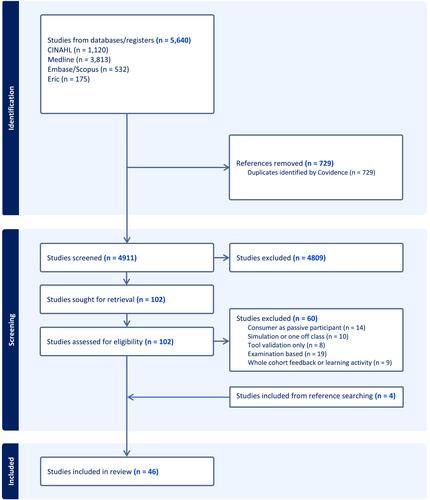Consumer contribution to occupational therapy student learning is mandated for Australian educational programs. However, there is limited research about how consumers contribute to student learning during practice placements. A scoping review was completed to explore the concepts of existing feedback systems for consumers to authentically contribute to student learning during practice placements.
Five databases were searched for all articles up to and including July 2023. All publications were included if they described and investigated authentic contribution to student learning during a practice placement experience. Data from the results and discussion sections of the papers were transformed into qualitative data and thematically analysed to develop a conceptual understanding of consumer feedback systems.
Forty-six papers met the eligibility criteria. Most articles originated from Medicine (30%) and Nursing (45%) education. Feedback systems were primarily designed to critique student communication and professional behaviours using a variety of standardised and non-standardised methods. Five interconnected themes were created that addressed the concepts of consumer feedback systems. The themes were (1) creating value specific for each stakeholder is essential, (2) preparation is required and nuanced; (3) consumers do engage and provide critical feedback when the system is supportive of all stakeholders; (4) gathering approaches need to be responsive to the diversity of practice and learning; (5) processing feedback with a trusted mentor is critical for learning.
Consumers, academics, practice educators, and students recognised that consumers have an important role in contributing to student learning during practice placements. Future consumer feedback systems need to be co-produced to create an optimal mode for consumers to authentically contribute to student learning constructively and safely.
A consumer consultant was a member of the advisory panel for the larger research project that this review is part of and provided advice to the research team at all stages of the project.
In Australia, occupational therapy training programs require input from consumers to help students learn. However, there is not much research on how consumers help occupational therapy students during their practical training. We did a review to see how existing feedback systems let consumers genuinely help students during their training. We searched five databases for research up to July 2023. We included research that talked about how consumers help all health students learn during practical training. We found 46 articles, mostly from Medicine and Nursing education. We analysed them to understand how consumer feedback systems work and found five main themes: (1) making sure everyone involved gets value out of it, (2) being prepared is important, (3) consumers give useful feedback when the system supports everyone involved, (4) different approaches are needed because practices and learning vary, and (5) discussing feedback with other people helps students learn. Current feedback systems mostly focused on how students communicate and behave professionally. Consumers, educators, and students all agree that consumers play a vital role in helping students learn during practical training. In the future, we need to work together to make feedback systems that let consumers help students in the best way possible, making sure it is constructive and safe for everyone.


